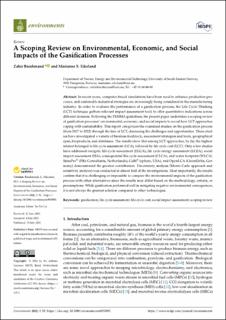| dc.description.abstract | In recent years, computer-based simulations have been used to enhance production processes, and sustainable industrial strategies are increasingly being considered in the manufacturing industry. In order to evaluate the performance of a gasification process, the Life Cycle Thinking (LCT) technique gathers relevant impact assessment tools to offer quantitative indications across different domains. Following the PRISMA guidelines, the present paper undertakes a scoping review of gasification processes’ environmental, economic, and social impacts to reveal how LCT approaches coping with sustainability. This report categorizes the examined studies on the gasification process (from 2017 to 2022) through the lens of LCT, discussing the challenges and opportunities. These studies have investigated a variety of biomass feedstock, assessment strategies and tools, geographical span, bioproducts, and databases. The results show that among LCT approaches, by far, the highest interest belonged to life cycle assessment (LCA), followed by life cycle cost (LCC). Only a few studies have addressed exergetic life cycle assessment (ELCA), life cycle energy assessment (LCEA), social impact assessment (SIA), consequential life cycle assessment (CLCA), and water footprint (WLCA). SimaPro® (PRé Consultants, Netherlands), GaBi® (sphere, USA), and OpenLCA (GreenDelta, Germany) demonstrated the greatest contribution. Uncertainty analysis (Monte Carlo approach and sensitivity analysis) was conducted in almost half of the investigations. Most importantly, the results confirm that it is challenging or impossible to compare the environmental impacts of the gasification process with other alternatives since the results may differ based on the methodology, criteria, or presumptions. While gasification performed well in mitigating negative environmental consequences, it is not always the greatest solution compared to other technologies. | en_US |

